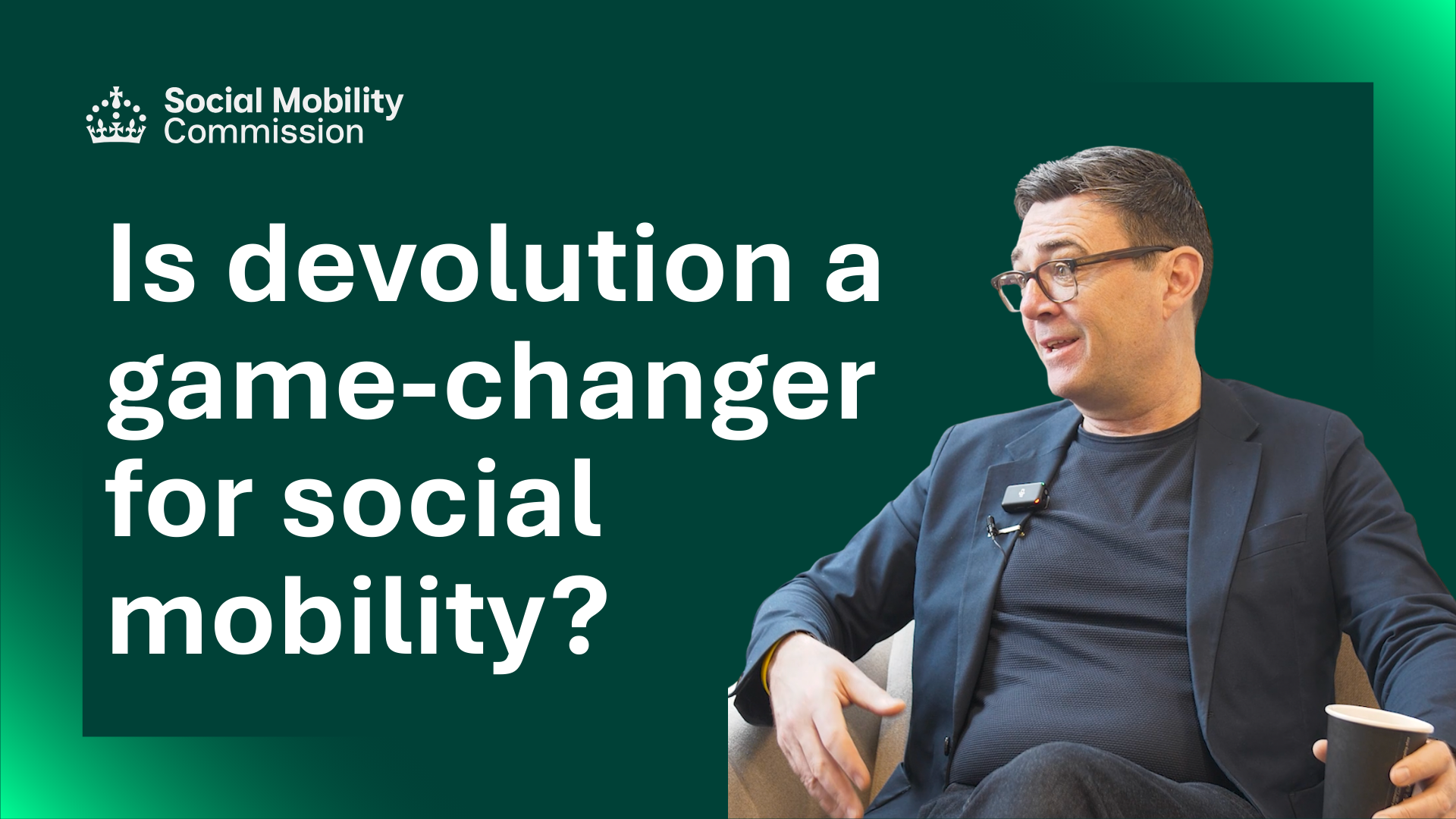A new debate on opportunity and social mobility
Are conventional approaches to social mobility actually limiting opportunity? Alun Francis, Chair of the Social Mobility Commission, tells us why policymakers must think differently.
Successive UK governments, organisations and businesses have been trying to improve social mobility. Yet despite their best efforts, the impact of many of their policies and interventions remains frustratingly limited.
The reasons for this are complex, but one thing is clear – we need to rethink how we approach social mobility.
Traditional approaches typically focus on the university pathway, attempting to support young people from less well-off backgrounds to get a degree and move into professional roles – an approach which has had some success.
But while that’s great for those involved and should be celebrated, we must also recognise that with less than 50% of 18-20 year olds studying for degree-level qualifications in 2022, and nearly one in five adults having no qualifications at all, this approach is not always relevant for many young people today.
The focus on these ‘lucky few’ runs the risk of wasting or underdeveloping the potential of large swathes of the population who do not follow traditional pathways to success or who live in places where opportunity is limited.
Our biggest social mobility challenge is not to obsess about the social mix within elite groups, but to create a wider range of good quality opportunities for a wide range of people in a wider range of places. It is a problem of supply as well as demand, in terms of both the volume of good jobs and of their distribution across the country.
The Social Mobility Commission’s latest report, Innovation Generation, considers how we can take a different approach to social mobility, which refocuses the debate on the real obstacles to opportunity. These are regional disparities, the problem of the “left behind”, and the growing inequality of opportunity across generations. We must recognise that the solutions to these challenges are more innovation, higher growth, and stronger and more evenly spread economic development, creating an environment which fosters growth and opens up career opportunities to different kinds of talent.
How should we rethink the narrative around opportunity?
The Social Mobility Commission State of the Nation report for 2024 revealed large geographical disparities in social mobility outcomes across the UK. Almost all areas with favourable outcomes are either in London or in the adjoining Home Counties of Surrey, Hertfordshire and Buckinghamshire. Those areas with less favourable outcomes, on the other hand, were more likely to be more remote from both London and other metropolitan areas – such as Cornwall, Dumfries and Scottish Borders. There was also a strong concentration of areas with unfavourable outcomes in the North East. It stands to reason, then, that effective place-based strategies, where local leaders can help to drive change, by fostering enterprise, investment and innovation, should form part of our approach.
We can see the emergence of these approaches with the current cross party consensus on accelerated devolution – but we would argue that these need to go further, in linking economic, educational and social change, if they are to be effective. The role of universities, within local growth and innovation partnerships, will almost certainly be critical, but alongside this the education and training system must provide genuine choices for young people and adults, as they develop and build their careers.
These pathways must place real skills, knowledge, know-how and enterprise at their centre, and must actively challenge the “credentialism” which makes qualifications a barrier rather than a gateway to opportunity. They also need to make sure that the benefits of innovation and growth are shared broadly, and address the enormous challenge of improving educational and economic outcomes for the most disadvantaged.
Another theme of our work at the Commission is that the current debate about social mobility is very confused about the “truly disadvantaged” and that we have a dismal track record of effective practice when it comes to improving their outcomes. This is partly because of the way the problem is defined, with definitions and data often used carelessly, where education is presented as a “magic bullet”.
While we agree that education has a uniquely transformational power, we cannot overlook the economy, or the hugely important role of communities, neighbourhood and families. We also cannot overlook the striking geographical patterns which have seen many of the same areas, often post-industrial, seaside or rural, consistently come last in terms of educational achievement.
We are keen to understand the interplay of economic, educational, neighbourhood and family issues, which sit behind these statistics. And we are keen that “social mobility” should not be solely focussed on those from poor backgrounds with the potential for elite outcomes, and should equally mean bringing opportunity to those who do not form part of this group. We are particularly concerned about the problem of 16-24 year old NEETS, and have to ask why so much time and resource is invested in widening participation to university, while the same effort to change life chances is not presented to those with the least opportunity.
How do we improve social mobility for future generations?
There is evidently a great deal of work to be done to improve opportunities for all in the United Kingdom. We have not set out to provide the answers to every aspect of the problem. The evidence tells us that there are no easy solutions. “Innovation Generation” sets out to establish a different framework for thinking about social mobility, so that policy relentlessly focuses on changing the things that really matter.
Related content

“Manchesterism”: Building the UK’s Leading Engine of Social Mobility – Andy Burnham joins Alun Francis for new podcast episode
Greater Manchester has become the trailblazer for English devolution, but what can other parts of the country learn from its experience? In the latest episode of Social Mobility Talks, Alun… read more
Topics

All NEETs are not the same, Social Mobility Commission warns government review
The national conversation on the nearly one million young people Not in Education, Employment or Training (NEETs) is failing to address the regional inequality and entrenched disadvantages behind the stats,… read more
Topics

Who shapes the future? Women, Tech and AI
Right now only 1 in 4 tech workers are women and just 9% are from a low socio-economic background. What does it mean when the sector shaping the future doesn’t… read more